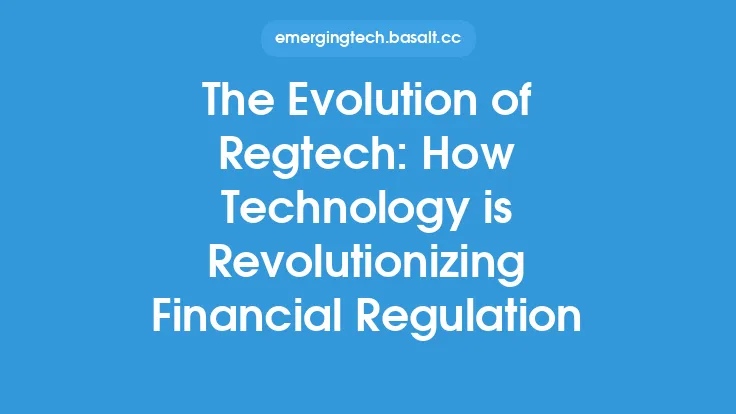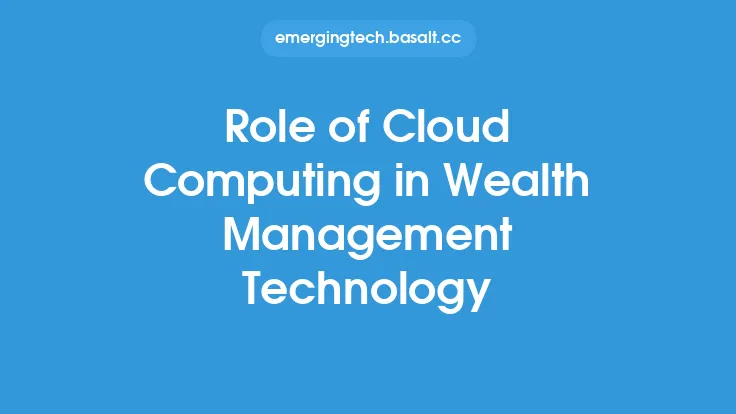The wealth management industry has undergone significant transformations in recent years, driven by advances in technology and changing investor expectations. At the heart of this evolution is the integration of digital solutions, which are revolutionizing the way wealth managers operate, interact with clients, and deliver investment services. This shift towards a more technology-driven approach is not only enhancing the efficiency and scalability of wealth management firms but also redefining the client experience and the role of the wealth manager.
Introduction to Wealth Management Technology
Wealth management technology encompasses a broad range of digital tools and platforms designed to support the wealth management process. This includes portfolio management systems, client relationship management (CRM) software, financial planning tools, and investment analysis platforms. The adoption of these technologies is enabling wealth managers to streamline their operations, improve client engagement, and make more informed investment decisions. By leveraging data analytics, artificial intelligence, and other digital capabilities, wealth managers can gain deeper insights into client needs and preferences, allowing for more personalized and effective wealth management strategies.
Impact of Technology on Wealth Management Operations
Technology is having a profound impact on the operational aspects of wealth management. Automated workflows and digital platforms are reducing manual processing times, minimizing errors, and enhancing compliance. For instance, robotic process automation (RPA) can be used to automate routine tasks such as data entry, account opening, and reporting, freeing up staff to focus on higher-value activities like financial planning and client advisory services. Additionally, cloud-based infrastructure is providing wealth management firms with greater flexibility, scalability, and cost savings, enabling them to quickly adapt to changing market conditions and client demands.
Client Experience and Engagement
The client experience is a critical component of wealth management, and technology is playing a key role in enhancing engagement and satisfaction. Digital portals and mobile apps are providing clients with real-time access to their investment portfolios, allowing them to track performance, view statements, and communicate with their wealth managers more easily. Furthermore, social media and other digital channels are enabling wealth managers to connect with clients and prospects in new and innovative ways, facilitating the sharing of market insights, investment ideas, and educational content. By leveraging these digital touchpoints, wealth managers can build stronger, more personalized relationships with their clients, leading to increased loyalty and retention.
Investment Decision Making and Portfolio Management
Technology is also transforming the investment decision-making process in wealth management. Advanced data analytics and machine learning algorithms are enabling wealth managers to analyze large datasets, identify trends, and make more informed investment decisions. For example, natural language processing (NLP) can be used to analyze financial news and social media sentiment, providing insights into market sentiment and potential investment opportunities. Additionally, portfolio optimization tools and risk management systems are helping wealth managers to construct and manage investment portfolios more effectively, ensuring that client assets are allocated in a way that aligns with their risk tolerance, investment objectives, and values.
Regulatory Compliance and Risk Management
The wealth management industry is subject to a complex and evolving regulatory landscape, and technology is playing a critical role in ensuring compliance and managing risk. Digital platforms and automated workflows are helping wealth managers to maintain accurate records, monitor transactions, and detect potential compliance issues. For instance, anti-money laundering (AML) and know-your-customer (KYC) systems are using machine learning and data analytics to identify suspicious activity and verify client identities. By leveraging these technologies, wealth managers can reduce the risk of non-compliance, protect client assets, and maintain the integrity of the financial system.
Future Outlook and Opportunities
As technology continues to evolve and improve, the wealth management industry is likely to experience even more significant transformations in the future. Emerging technologies like quantum computing, augmented reality, and the Internet of Things (IoT) may offer new opportunities for wealth managers to enhance the client experience, improve investment outcomes, and streamline operations. Additionally, the growing adoption of environmental, social, and governance (ESG) investing and impact investing is creating new challenges and opportunities for wealth managers, who must balance client values and preferences with investment objectives and risk management considerations. By embracing innovation and staying at the forefront of technological advancements, wealth managers can position themselves for success in a rapidly changing industry and deliver more effective, personalized, and sustainable wealth management solutions to their clients.





